Does climate change have you feeling unsettled or anxious? You’re not alone — a recent survey found that 63% of adults in the United States reported feeling worried or “very worried” about climate change.
That result doesn’t surprise us: The number of climate-related disasters each year keeps growing, the projections of future risk keep getting worse, and our current government keeps doing everything in its power to prop up fossil fuels and dismantle climate protections.
But while this eco-anxiety can, at its worst, make us feel overwhelmed or unable to make a difference, another study found that people experiencing climate distress are more likely to participate in collective climate action to help turn things around.
That’s a common message in five important new books about climate anxiety: The best way to fight it is to do something about it.
The official descriptions for these books appear below. The link for each title goes to the publishers’ sites, but you should also be able to find these books from your local booksellers or libraries.
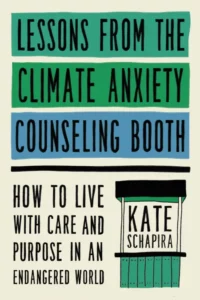
Lessons From the Climate Anxiety Counseling Booth: How to Live With Care and Purpose in an Endangered World
by Kate Schapira
Climate anxiety is real. This practical, accessible guide addresses it on personal, relational, and structural levels: Summer after summer is hotter than the last, homes are flooding, burning, blowing away. We live with the loss, pain, and grief of what’s happened, and anxiety for what might happen next, as the systems we live are increasingly strained.
Seeking a way to reach out and connect, Schapira set up a “Peanuts”-style “The Doctor Is In” booth at to talk about climate change with people in her community. Ten years and over 1,200 conversations later, Schapira channels all she’s learned into an accessible, understandable guide for processing climate anxiety and connecting with others to carry out real change in your life and your community.
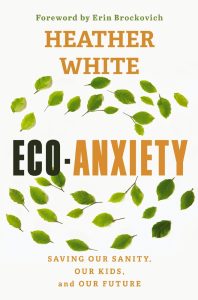
Eco-Anxiety: Saving Our Sanity, Our Kids, and Our Future
by Heather White
Foreword by Erin Brockovich
The climate crisis and its resulting eco-anxiety is the biggest challenge of our time. The anxiety that comes with worrying about how environmental harm will impact each of us, and our children’s lives can be overwhelming. This book will guide you to understand the impacts of the climate crisis on mental health. There’s a 21-Day Kickstarter Plan on specific sustainable actions you can take and track your progress to help you measure mental health benefits. Plus, engaging stories of eco-heroes and positive change. Learn techniques for listening to and discussing with loved ones their climate worries, and how environmental and conservation organizations that align with your Service Superpower and interests might inspire your family, friends, and community to work toward a regenerative, sustainable world
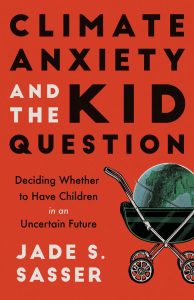
Climate Anxiety and the Kid Question: Deciding Whether to Have Children in an Uncertain Future
by Jade Sasser
Eco-anxiety. Climate guilt. Pre-traumatic stress disorder. Solastalgia. The study of environmental emotions and related mental health impacts is a rapidly growing field, but most researchers overlook a closely related concern: reproductive anxiety. Climate Anxiety and the Kid Question is the first comprehensive study of how environmental emotions influence whether, when, and why people today decide to become parents — or not.
Sasser argues that we can and should continue to create the families we desire, but that doing so equitably will require deep commitments to social, reproductive, and climate justice, presenting original research, in-depth interviews and national survey results that analyze the role of race in environmental emotions and the reproductive plans young people are making as a result. Climate emotions and climate justice are inseparable, and culturally appropriate mental and emotional health services are a necessary component to ensure climate justice for vulnerable communities.
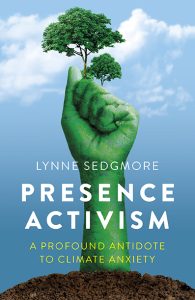
Presence Activism: A Profound Antidote to Climate Anxiety
by Lynne Sedgmore
Sedgmore integrates presence, climate activism, and the alleviation of climate anxiety in an innovative and unique synthesis and new term: Presence Activism. By offering a profound solution with new perspectives, this book is steeped in a presence that moves activism beyond metaphors of war, enemies, and destruction, as well as the illusion of separation, into the visceral knowing of presence and interconnection, thereby making presence an important part of the way forward for current and future activism.
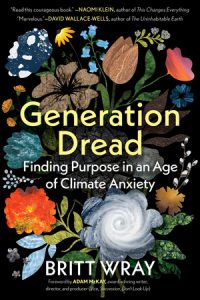
Generation Dread: Finding Purpose in an Age of Climate Anxiety
by Britt Wray
Foreword by Adam McKay
Faced with record-breaking temperatures, worsening wildfires, more severe storms, and other devastating effects of climate change, feelings of anxiety and despair are normal. In Generation Dread, Britt Wray reminds us that our distress is, at its heart, a sign of our connection to and love for the world. The first step toward becoming a steward of the planet is connecting with our climate emotions — seeing them as a sign of our humanity and empathy and learning how to live with them. Wray, a scientist and expert on the psychological impacts of the climate crisis, brilliantly weaves together research, insight from climate-aware therapists, and personal experience, to illuminate how we can connect with others, find purpose, and thrive in a warming, climate-unsettled world.
Let us know what you think. Send your ideas, success stories, and other book recommendations to [email protected].
For hundreds of additional environmental books — including several on staying calm in challenging times — visit the Revelator Reads archives.
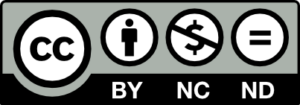
Previously in The Revelator:
The Psychological Effects of Climate Change: The Scientific Explanations — and Solutions That Can Empower Your Mind

